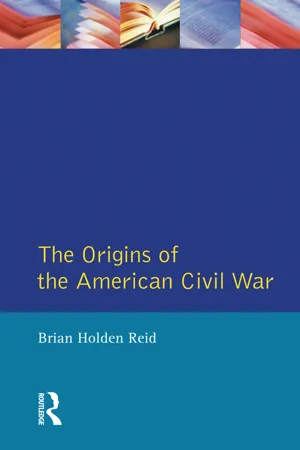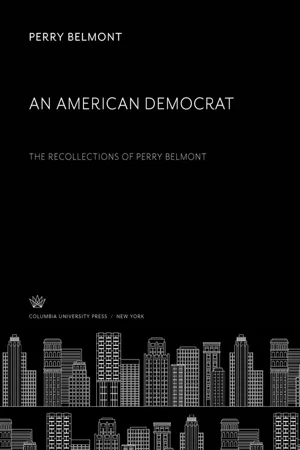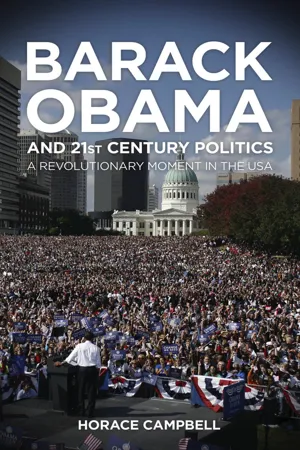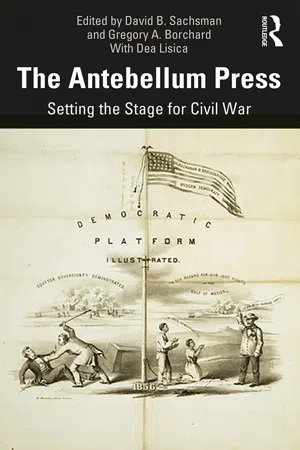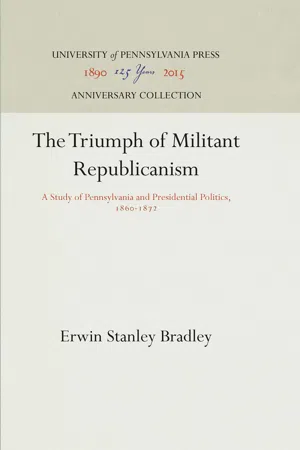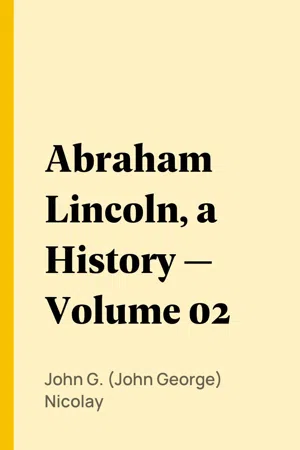History
1860 Democratic Convention
The 1860 Democratic Convention was a pivotal event in American politics, held in Charleston, South Carolina. The convention was marked by deep divisions over the issue of slavery, leading to the split of the Democratic Party into Northern and Southern factions. This division ultimately contributed to the election of Abraham Lincoln as the first Republican president.
Written by Perlego with AI-assistance
Related key terms
1 of 5
6 Key excerpts on "1860 Democratic Convention"
- eBook - ePub
- Brian Holden Reid(Author)
- 2014(Publication Date)
- Routledge(Publisher)
Will always keep a “Pryor” engagement – a reference to Roger Pryor, a Virginia secessionist. The Convention was just as much theatre as political forum. Groups of men were enjoined to shout chants for their candidate; here Lincoln, a local figure, enjoyed an enormous advantage. Bargains were struck on the convention floor, gossip, the lifeblood of politics and the addiction of professional politicians, was exchanged, and agreement was reached. As Halstead made clear, ‘the amount of idle talking that is done is amazing’.Men gather in little groups, and with their arms about each other, and chatter and whisper as if the fate of the country depended upon their immediate delivery of the mighty political secrets with which their imaginations are big. There are a thousand rumours afloat, and things of incalculable moment are communicated to you confidentially, at intervals of five minutes.… The current of the universal twaddle this morning is that ‘Old Abe’ will be the nominee.Allan Nevins rightly described this gathering as ‘bedlamite confusion’. Experts at political gatherings are often proved wrong in their predictions, and the most striking feature of conventions in the nineteenth century was their propensity for throwing aside famous and accomplished candidates in favour of the comparatively untried and inexperienced man. In 1852 the Democrats had chosen Franklin Pierce, a man overwhelmed by his responsibilities and unequal to the demands of his high office; in 1860 the Republican Party was rather more fortunate.22The confusion and loquacity of the proceedings at Chicago at first sight appeared to be an obstacle to reaching a wise decision as to who should lead the party into the most important race since the unopposed election of George Washington in the first presidential election of 1792. On 16 May David Wilmot, now past his best, was appointed chairman. ‘He is a dull, chuckel headed booby looking man’, Browning thundered in his diary, ‘and makes a very poor presiding officer’.23 - eBook - PDF
An American Democrat
The Recollections of Perry Belmont
- Perry Belmont(Author)
- 2019(Publication Date)
- Columbia University Press(Publisher)
I was not too young to understand what those services were. 1 7 See pp. 575-576. 126 The Democratic Party and the Civil War I felt a deep resentment, which I have not outlived, that partisan propaganda persistently endeavored to diminish the vital im-portance to the Union of the unselfish aid so well recognized and so appreciated at the time. It is for this reason that, while not always agreeing with the leaders of my own party, and in certain instances even having been in public disagreement with them, I have never voted for a Republican candidate, and see no reason why I ever should. C H A P T E R I V McCLELLAN CONVENTION, 1864 -UNIVERSITY DAYS I N 1 8 6 4 , THE DEMOCRATIC CONVEN-tion at Chicago nominated General McClellan. My father, a delegate from New York and chairman of the Democratic Na-tional Committee, called the convention to order as presid-ing officer and made the opening speech. He took me with him to the convention. In the immense tent which housed it, there was provision for only a limited number of spectators. The deep impression made upon me by the conduct, proceedings, and magnificent setting of that assemblage remains with me still. Although the nation was engaged in civil war, the convention was distinguished by its dignity, calm deliberation, and orderly pro-cedure. I still have the conviction that such a gathering repre-sented American public life at its best. As a delegate to the Democratic Conventions which nominated Hancock (1880), Cleveland (1884, 1888, and 1892), Bryan (1896), Palmer (1896), Parker (1904), and Wilson (1912), I have witnessed a deplorable change. It has become the habit of delegates in the arena of political conventions to appear as if engaged in a performance for the benefit of the attending multi-tudes. Prolonged hysterical shouting and noisy demonstrations of every sort destroy all semblance of deliberation. Nor are these exhibitions of manufactured enthusiasm limited to the conven-tion alone. - eBook - PDF
Barack Obama and Twenty-First-Century Politics
A Revolutionary Moment in the USA
- Horace G. Campbell(Author)
- 2010(Publication Date)
- Pluto Press(Publisher)
6 BETWEEN THE PAST AND THE FUTURE: THE DEMOCRATIC NATIONAL CONVENTION BURDENS OF THE PAST When the Democratic National Convention (DNC) met in Denver, Colorado, August 25–28, 2008, with over 50,000 accredited dele-gates, media, and assorted political followers, it was 100 years since the party had last convened in a state then called “the gateway to the west.” Forty years before, at the 1968 Convention in Chicago, street demonstrations had overshadowed the proceedings on the conven-tion floor. In every area of deliberation and presentation, the 2008 convention and the party were caught between the frontier past and the future of human cooperation, environmental justice, and peace. The theme of the convention was “Changing the course of the nation,” and there were numerous forces present that wanted change while others wished to hold on to the past. Obama had provided the leadership to bring the largest number of delegates to the nomina-tion, but many of the seasoned elements of the state party machinery did not acknowledge his victory in the primaries and caucuses. Denver, Colorado was a place in the United States where the history of the formation of the United States (the Louisiana Purchase and the Mexican American War) clashed with the future of the economic and political integration of the North American peoples and societies. Slowly, the geodemographers began to realize that the growth of the Latino/Hispanic population would have seismic implications for US political culture, especially at a moment of radicalization of Latin America and the Caribbean. Some of the more farsighted political strategists and intelligentsia understood the future and were hoping to muddy this reality by sowing divisions 154 BARACK OBAMA AND TWENTY -FIRST -CENTURY POLITICS among the oppressed. Obama was to be the nominal head while the old thinking and Anglo-Saxon hegemony would not be disturbed. - eBook - ePub
The Antebellum Press
Setting the Stage for Civil War
- David B. Sachsman, Gregory A. Borchard(Authors)
- 2019(Publication Date)
- Routledge(Publisher)
Part III The Election of 1860 and the Crisis of SecessionPassage contains an image
17
The Democrats Divide
Newspaper Coverage of the 1860 Presidential Conventions
Brian GabrialAs the nation headed into the 1860 election season, it would not be business as usual. For one thing, the aftershocks of John Brown’s raid on Harpers Ferry continued to haunt the world of politics despite it being months since his neck met the noose. Indeed, his very name became an agitprop for Southern Democrats and their newspaper allies to use against the upstart Republicans. “The success of such a party,” a Richmond Enquirer editorial said shortly after Republicans met for their May convention, would encourage “all the John Browns that now secretly await an opportunity to avenge the death of the pioneer in the cause of which is to be perfecter and finisher.”1 But while the Republicans were settling on their antislavery platform and candidate, the Democratic Party was falling apart. The first Democratic convention failed to select a presidential candidate, and the second convention would fail as well. All the while, a significant portion of the Democratic delegates had already decided party unity did not matter unless they secured a proslavery platform and the right candidate to support it.On some level, the irony of the 1860 election was that the political party with the most to lose over slavery was the party most in favor of it. Democrats, North and South, wrestled with a single question: How much should slavery be supported? The Richmond Enquirer articulated the Southern view perfectly in its almost daily reminder of what the party should stand for on the “Slavery Question”: “Absolute non-interference,” its editor wrote, “by the General Government, to introduce or to exclude slaves, in any of the territories of the Union.”2 No less insistent on that point was the Charleston Mercury ’s Robert Barnwell Rhett, who warned ten days before the Democrats met for their first convention in Charleston, that the South “should take her rights and destiny into her own hands” if Northern voters voted against a proslavery candidate.3 The fire-eater demanded that the election results should give Southerners “peace with our rights and institutions.” For Rhett and others like him, this meant the victor in the next presidential election had to profess non-interference when it came to slavery or, as Rhett wrote, Southerners would “take a separation of our Union with them.”4 - eBook - PDF
The Triumph of Militant Republicanism
A Study of Pennsylvania and Presidential Politics, 1860-1872
- Erwin Stanley Bradley(Author)
- 2016(Publication Date)
That, as proclaimed by the leading Democratic journals, there was universal satisfaction with the platform there could be little doubt, conceded the People's Party, because one could draw from it according to his individual needs. Democratic interest soon transferred its attention For proceedings see Philadelphia Public Ledger, March 1, 2, 1860; Bedford Gazette, March 9, 1860. Stan wood, History of the Presidency, 268. Philadelphia Public Ledger, March 2, 1860, The Republican Triumph of 1860 73 from the state to the national scene centering upon the proceedings soon to take place at Charleston, South Carolina, chosen seat of the 1860 Democratic National Convention, where, it was realized, the issues so lightly glossed over at the state convention must now be squarely faced. In the deep South, where control of the party machinery had passed into the hands of the radical states' rights men, many of them of the Yancey-Rhett stripe, a new sectional party was in the rapid process of generation. That an amended, more radical Alabama platform was to be forced upon the coming convention there could be no doubt. This platform, if adopted as national policy, would have made it impossible to bar slavery from territory any-where even at the express wish of its legislature. Slavery must be positively maintained under Federal protection To the Southern fire-eater the Douglas doctrine of popular sovereignty was, in its essence, even more insidious than that contained within the seeds of Black Republicanism. But what if the Douglas men, who in most cases really repre-sented free states, should capture the convention ! The Charleston Democratic National Convention resulted in one of the most notable political fiascos on record. The Southern delegates walked dramatically out of the conven-tion when they saw their platform defeated.* 0 The Pennsyl-vania delegates, led by William Bigler, a Buchanan man, had first gotten out of hand by voting for Benjamin F. - eBook - ePub
- John G. (John George) Nicolay(Author)
- 2004(Publication Date)
- Perlego(Publisher)
The platform devised by the Philadelphia Convention was unusually bold in its affirmations, and most happy in its phraseology. Not only did it "deny the authority of Congress, or of a territorial legislature, of any individual or association of individuals, to give legal existence to slavery in any Territory of the United States"; it further "Resolved, That the Constitution confers upon Congress sovereign power over the Territories of the United States for their government, and that in the exercise of this power it is both the right and the duty of Congress to prohibit in the Territories those twin relics of barbarism—polygamy and slavery." At Buchanan, recently nominated by the Democratic National Convention in Cincinnati, it aimed a barbed shaft: "Resolved, That the highwayman's plea that 'might makes right,' embodied in the Ostend circular, was in every respect unworthy of American diplomacy, and would bring shame and dishonor upon any government or people that gave it their sanction." It demanded the maintenance of the principles of the Declaration of Independence, of the Federal Constitution, of the rights of the States, and the union of the States. It favored a Pacific railroad, congressional appropriations for national rivers and harbors; it affirmed liberty of conscience and equality of rights; it arraigned the policy of the Administration; demanded the immediate admission of Kansas as a State, and invited "the affiliation and coöperation of men of all parties, however differing from them in other respects, in support of the principles declared."The nominees and platform of the Philadelphia Convention were accepted by the opposition voters of the free-States with an alacrity and an enthusiasm beyond the calculation of even the most sanguine; and in November a vote was recorded in their support which, though then unsuccessful, laid the secure foundation of an early victory, and permanently established a great party destined to carry the country through trials and vicissitudes equal in magnitude and results to any which the world had hitherto witnessed.In that year none of the presidential honors were reserved for the State of Illinois. While Lincoln thus narrowly missed a nomination for the second place on the Republican ticket, his fellow-citizen and competitor, Douglas, failed equally to obtain the nomination he so much coveted as the candidate of the Democratic party. The Democratic National Convention had met at Cincinnati on the 2d day of June, 1856. If Douglas flattered himself that such eminent services as he had rendered the South would find this reward, his disappointment must have been severe. While the benefits he had conferred were lightly estimated or totally forgotten, former injuries inflicted in his name were keenly remembered and resented. But three prominent candidates, Buchanan, Pierce, and Douglas, were urged upon the convention. The indiscreet crusade of Douglas's friends against "old fogies" in 1852 had defeated Buchanan and nominated Pierce; now, by the turn of political fortune, Buchanan's friends were able to wipe out the double score by defeating both Pierce and Douglas. Most of the Southern delegates seem to have been guided by the mere thought of present utility; they voted to renominate Pierce because of his subservient Kansas policy, forgetting that Douglas had not only begun it, but was their strongest ally to continue it. When after a day of fruitless balloting they changed their votes to Douglas, Buchanan, the so-called "old fogy," just returned from the English mission, and therefore not handicapped by personal jealousies and heart-burnings, had secured the firm adhesion of a decided majority mainly from the North.[3]
Index pages curate the most relevant extracts from our library of academic textbooks. They’ve been created using an in-house natural language model (NLM), each adding context and meaning to key research topics.
